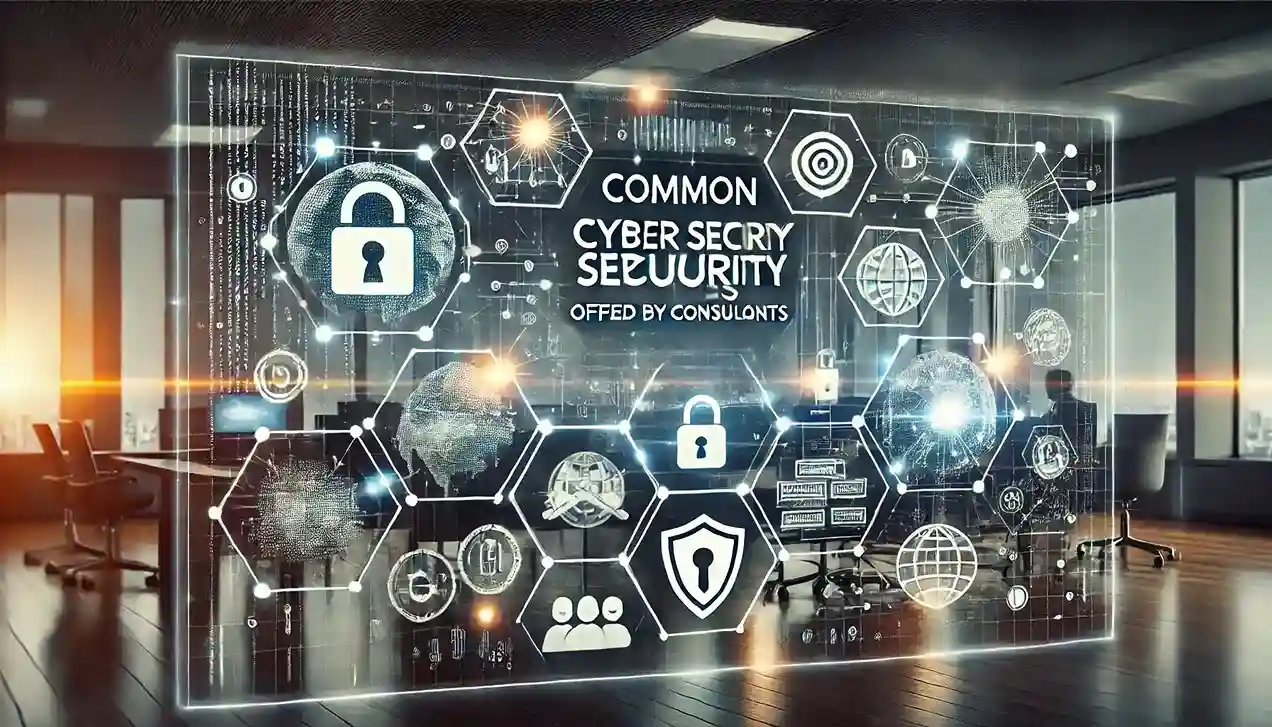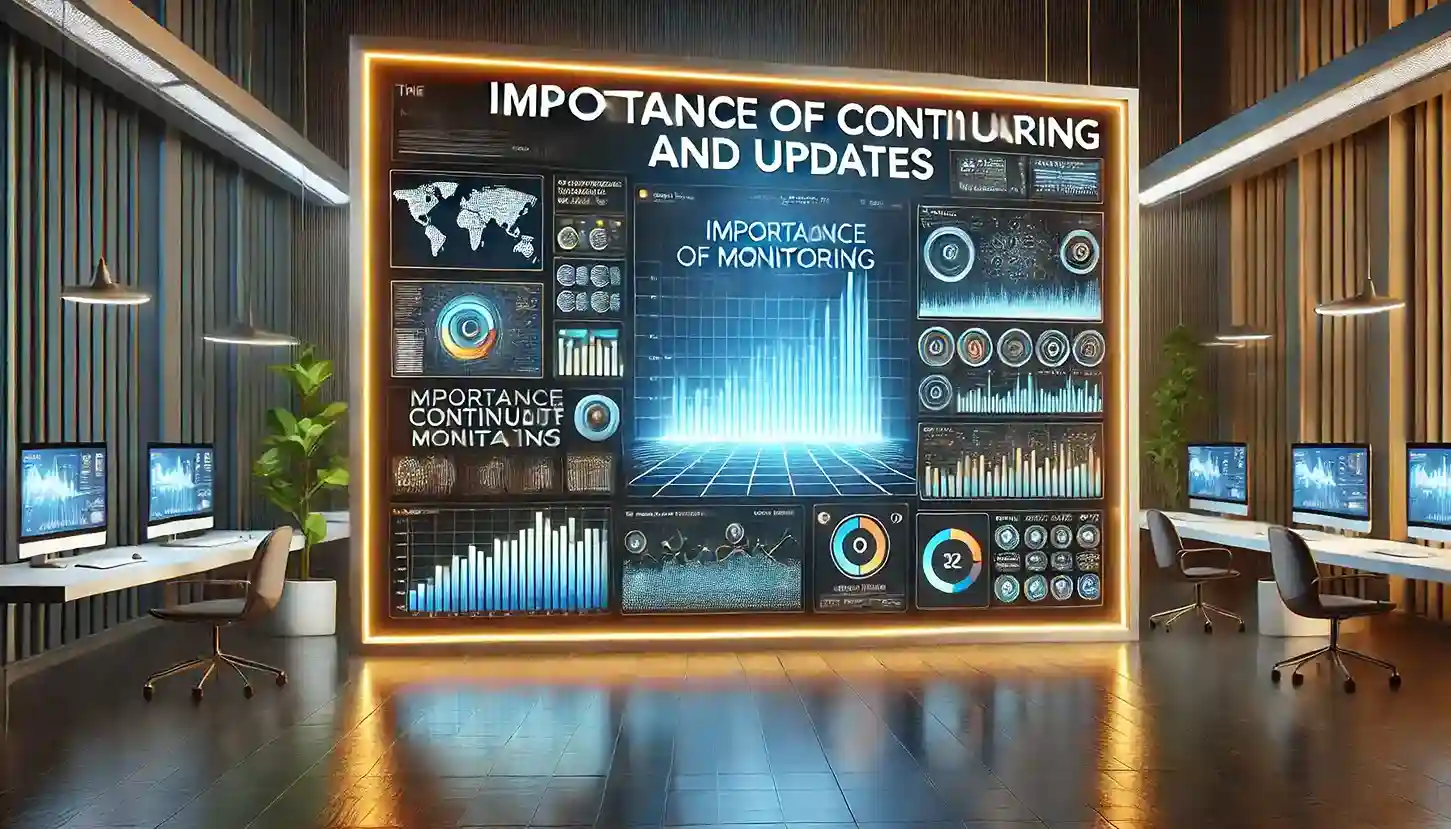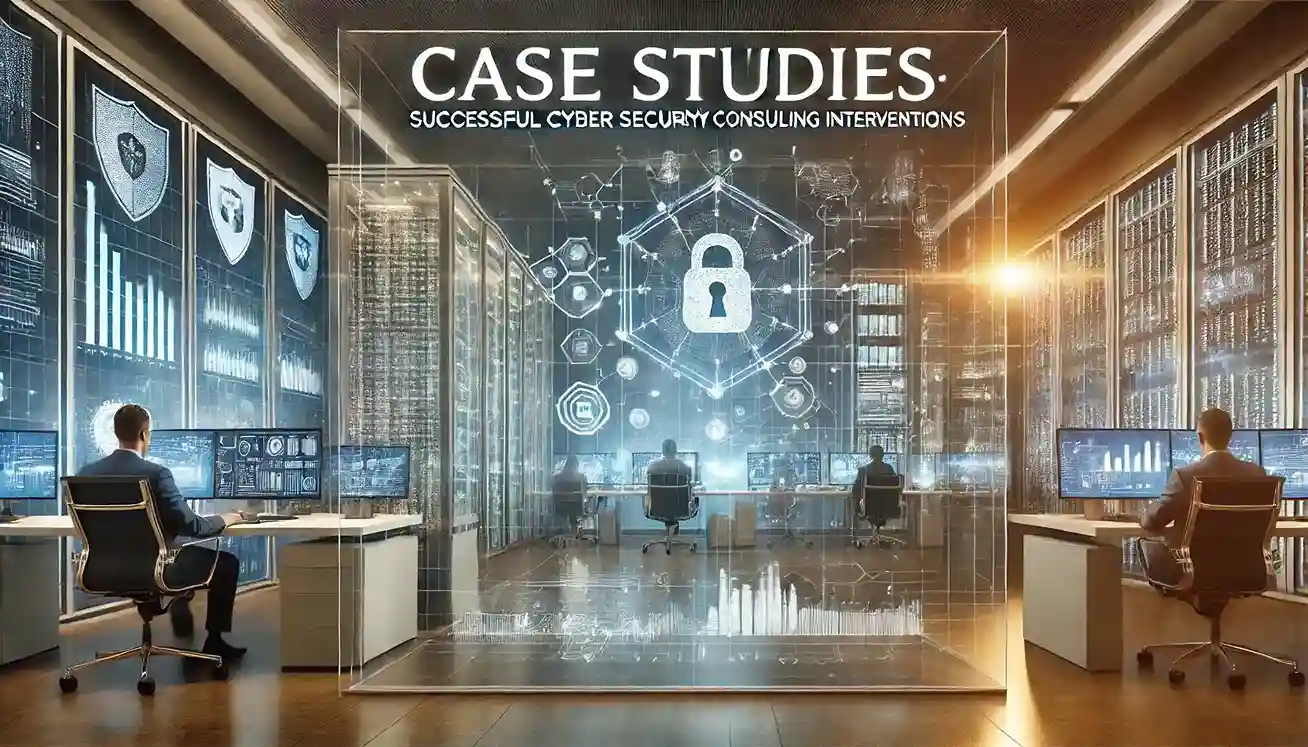Cyber Security Consulting
In today’s digitally driven world, the threat landscape has grown dramatically, and cybercriminals have become more sophisticated. Cyber security consulting plays a critical role in protecting businesses of all sizes from cyber attacks, data breaches, and other vulnerabilities. Cyber security consultants offer expert advice and tailor-made solutions to safeguard businesses’ data, networks, and infrastructure. This blog explores the core aspects of cyber security consulting, from its importance to the responsibilities of consultants, and why it’s particularly crucial for small and medium enterprises (SMEs).
What is Cyber Security Consulting?
Cybersecurity consulting is a service provided by professionals or firms specializing in assessing and improving the security posture of a business. Consultants analyze a company’s systems, identify vulnerabilities, and offer strategies to mitigate the risk of cyber attacks. They provide strategic advice, conduct risk assessments, and create custom security solutions tailored to each organization’s needs. This process is not just about preventing attacks but also about creating a secure digital environment for businesses to operate confidently Cyber security consulting.
Importance of Cyber Security Consulting for Businesses
As businesses increasingly adopt digital technologies, they also expose themselves to various cyber threats. A single data breach can lead to significant financial losses, legal penalties, and reputational damage. Cyber security consultants help businesses stay ahead of these threats by providing:
- Risk Assessment: Identifying potential weaknesses in systems, applications, and networks.
- Compliance: Ensuring that businesses comply with industry standards and regulations.
- Incident Response Planning: Preparing organizations to respond effectively in the event of a cyber attack.
- Training: Educating staff on best practices for cyber hygiene and threat detection.
By partnering with experienced consultants, businesses can take proactive measures to prevent breaches, ensuring the continuity of their operations and the protection of their customers’ data.
These threats can disrupt business operations, lead to financial losses, and damage a company’s reputation. Cyber security consultants work to identify these risks and develop strategies to protect businesses from them.
The Role of a Cyber Security Consultant
Cyber security consultants are the frontline defenders in the digital world, helping businesses assess their risks and implement robust security measures. Their role involves not only addressing current threats but also anticipating future vulnerabilities and threats Cyber security consulting.
Key Responsibilities of a Cyber Security Consultant
A cyber security consultant’s primary responsibilities include:
- Security Assessment: Performing comprehensive audits of an organization’s IT infrastructure to identify vulnerabilities.
- Threat Modeling: Predicting potential attack vectors and developing strategies to counteract them.
- Developing Security Policies: Creating and enforcing policies that dictate how employees and systems interact securely.
- Incident Response Planning: Helping businesses prepare for, detect, and respond to cyber incidents.
- Compliance Management: Ensuring the organization meets industry regulations and data protection laws such as GDPR, HIPAA, or PCI-DSS.
Skills and Expertise Required for Consultants
Cyber security consultants need to have a mix of technical skills, strategic thinking, and experience across various security domains. Some essential skills include:
- Technical Knowledge: Expertise in firewalls, intrusion detection systems, encryption, and network security Cyber security consulting.
- Ethical Hacking: The ability to think like a hacker to anticipate how attacks could occur.
- Risk Management: Understanding how to quantify risks and propose cost-effective solutions.
- Communication: Translating complex technical issues into language that non-technical stakeholders can understand.
Consultants must continuously stay updated with the latest cyber threats and technologies, making ongoing learning a critical part of their role.
How Consultants Stay Ahead of Emerging Threats
The cyber threat landscape is constantly evolving, which means consultants need to stay ahead of the curve. They do this by:
- Continuous Learning: Regularly attending training, seminars, and certifications to keep their skills current.
- Threat Intelligence: Utilizing the latest threat intelligence to understand new and emerging attack vectors.
- Network of Experts: Collaborating with other experts in the field to share knowledge and best practices Cyber security consulting.
Consultants also leverage advanced tools and methodologies such as penetration testing and ethical hacking simulations to stay proactive in threat prevention.
Why Cyber Security Consulting is Crucial for Small and Medium Enterprises (SMEs)
While large enterprises often have the resources to invest in extensive security measures, SMEs face unique challenges when it comes to cybersecurity. These businesses often operate with tighter budgets and fewer resources, making them more vulnerable to cyber threats Cyber security consulting.
Unique Challenges SMEs Face
Small and medium enterprises often face specific challenges in maintaining robust cyber security, such as:
- Limited IT Resources: Many SMEs do not have dedicated in-house IT teams, making it harder to stay on top of cyber threats.
- Budget Constraints: SMEs may not have the financial resources to invest in the latest security technologies.
- Lack of Awareness: Employees in smaller businesses may not be fully aware of the best practices for cyber security, increasing the risk of human error.
These factors make SMEs attractive targets for cybercriminals, who know that smaller businesses may be less prepared to defend themselves Cyber security consulting .
The Cost of a Cybersecurity Breach for SMEs
- Data Recovery Expenses: The cost of restoring lost or stolen data.
- Downtime: Businesses can suffer from operational downtime, losing valuable sales and productivity.
- Fines and Legal Penalties: Non-compliance with data protection laws can result in hefty fines.
- Reputation Damage: Losing customer trust can be difficult to recover from and can have long-term impacts on sales and customer loyalty.
For SMEs, the aftermath of a cyber attack can sometimes mean the difference between survival and bankruptcy.
Tailored Solutions for SME Cyber Security
Cyber security consulting offers SMEs tailored solutions that fit within their budget constraints and specific needs. Some examples of solutions include:
- Cloud Security Services: Ensuring that cloud-based services are secure and compliant with data protection laws.
- Managed Security Services: Outsourcing day-to-day security operations to a consultant, ensuring constant protection Cyber security consulting.
- Employee Training: Providing workshops and training sessions for employees to improve their understanding of cyber security best practices.
By working with a cyber security consultant, SMEs can create a robust defense strategy without stretching their budget.
Common Cyber Security Services Offered by Consultants

Cyber security consultants offer a range of specialized services tailored to the unique needs of businesses. These services help organizations identify weaknesses in their systems, respond to security incidents, and maintain a robust security posture. Below are some of the most common services provided by cyber security consultants.
Security Audits and Assessments
A security audit is an in-depth review of a company’s IT systems, networks, and processes to assess its current security posture.
- Identify vulnerabilities and weaknesses in the infrastructure.
- Assess compliance with industry regulations and standards.
- Evaluate the effectiveness of existing security measures.
The assessment phase involves analyzing the organization’s defenses, testing the systems against potential attack scenarios, and providing a detailed report with actionable insights to strengthen the overall security Cyber security consulting.
Incident Response and Management
Incident response is a critical service that consultants provide to help businesses quickly address and mitigate the damage from a cyber attack. A well-structured incident response plan outlines the steps an organization must take in the event of a cyber incident, such as:
- Containing and eradicating the threat.
- Restoring affected systems and data.
Consultants offer guidance and support throughout this process, ensuring the business recovers as swiftly and smoothly as possible while minimizing damage and downtime.
Vulnerability Testing and Penetration Testing
Vulnerability testing involves scanning a company’s systems and networks to identify known weaknesses that hackers could exploit. This proactive approach helps businesses fix these issues before they can be targeted.
Penetration testing, on the other hand, is a more in-depth evaluation where consultants simulate real-world cyber attacks to test the organization’s defenses. These tests can uncover:
- Weaknesses in system configurations.
- Flaws in applications or software.
- Gaps in network security.
Both tests are essential for maintaining strong security by continually assessing and addressing potential entry points for attackers Cyber security consulting.
Developing a Comprehensive Cybersecurity Strategy
Creating a robust cybersecurity strategy requires a well-thought-out plan tailored to the specific risks and requirements of a business. Cyber security consultants help organizations develop comprehensive plans that cover all aspects of security, from prevention to detection and response Cyber security consulting.
Steps to Create a Cybersecurity Plan
- Risk Assessment:
- Identify and prioritize the organization’s critical assets and the risks associated with them. Understand which systems and data are most valuable and what threats are most likely to affect them.
- Define Security Objectives:
- Establish clear security goals, such as protecting customer data, ensuring compliance, or reducing the risk of downtime due to a cyber attack.
- Implement Policies and Procedures:
- Develop detailed policies that dictate how systems should be accessed and used, password protocols, employee access levels, and other critical security procedures.
- Deploy Security Tools and Technologies:
- Based on the risks identified, deploy the appropriate security tools (e.g., firewalls, antivirus software, intrusion detection systems).
- Establish Incident Response Plans:
- Prepare for the worst by developing an incident response plan that outlines the steps to be taken when a security breach occurs.
- Regular Training and Awareness:
- Conduct regular employee training sessions to ensure that staff understand the importance of cyber security and how to identify and prevent cyber threats.
Tools and Technologies Used in Cybersecurity
- Firewalls:
- Firewalls are a fundamental security tool that helps filter traffic entering and leaving a network, blocking malicious traffic and unauthorized access.
- Encryption Software:
- Encryption protects sensitive data by converting it into a code that can only be decrypted by authorized users, ensuring data security both at rest and in transit.
- Intrusion Detection Systems (IDS):
- IDS tools monitor a network for suspicious activity or policy violations, triggering alerts when potential threats are detected.
- Security Information and Event Management (SIEM):
- SIEM solutions aggregate and analyze data from various security tools to provide real-time insights into security events across the organization.
Importance of Continuous Monitoring and Updates

In cyber security, staying proactive is key to maintaining strong defences.
- New Threats Are Detected Early: Continuous monitoring enables real-time detection of new threats as they emerge, allowing businesses to respond before significant damage is done.
- Security Tools Remain Effective: Regular updates to security tools and software ensure that they are equipped to handle the latest attack methods.
- Compliance Is Maintained: Many industries require continuous security monitoring to ensure compliance with regulations such as GDPR or HIPAA.
Businesses that rely on cyber security consultants to maintain ongoing monitoring and make updates to their security measures can reduce the likelihood of a breach and remain protected against evolving threats.
Selecting the right cyber security consulting firm can significantly impact your business’s ability to prevent, detect, and respond to cyber threats. With so many firms offering cybersecurity services, it can be overwhelming to make the right choice. This section will outline the key factors you should consider when selecting a consultant, how to evaluate their past performance, and what certifications and industry standards are essential.
Key Factors to Consider When Selecting a Consultant
When choosing a cyber security consulting firm, it’s essential to assess the firm’s experience, expertise, and ability to meet your business’s specific security needs. Here are the key factors to consider:
- Industry Experience: Look for a firm with a track record of working with businesses in your industry. Different industries face unique security challenges (e.g., healthcare needs to comply with HIPAA, while financial services must prioritize data encryption), so it’s crucial to choose a firm that understands your specific requirements.
- Range of Services: Ensure the consulting firm offers a comprehensive range of services, including security audits, vulnerability testing, incident response, and ongoing monitoring. A firm that can provide end-to-end security services is more likely to deliver lasting protection for your business.
- Proactive vs. Reactive Approach: A good consulting firm doesn’t just respond to security breaches but also helps prevent them through regular risk assessments, updates, and proactive measures. Firms that emphasize proactive security measures offer long-term protection rather than just patching immediate vulnerabilities.
- Customization and Scalability: Your business’s security needs will change over time, especially as it grows or adopts new technologies. Choose a consulting firm that offers customized solutions and can scale its services to match your evolving needs.
- Communication and Support: Effective communication is crucial when it comes to cyber security. The consulting firm should provide regular updates, clear explanations of technical issues, and 24/7 support for critical security incidents.
Evaluating Past Client Success Stories
One of the best ways to gauge a firm’s effectiveness is by reviewing their past client success stories or case studies. Here’s how you can evaluate these success stories:
- Relevance: Focus on case studies that are relevant to your industry or security needs. For example, if your business operates in e-commerce, look for case studies that highlight how the firm has prevented data breaches for online retailers.
- Measurable Results: Successful case studies should present measurable outcomes, such as reduced incidents of cyber attacks, faster recovery from breaches, or improved compliance with regulations Cyber security consulting.
- Client Testimonials: Testimonials from past clients offer insight into the firm’s ability to communicate, meet deadlines, and provide ongoing support. Positive feedback from reputable businesses in your industry is a good indicator of the firm’s credibility.
- Problem-Solving Ability: Look for case studies that demonstrate the firm’s problem-solving capabilities, especially when dealing with complex or high-risk security issues Cyber security consulting.
Certifications and Industry Standards to Look For
Certifications demonstrate that a cyber security consulting firm adheres to industry standards and best practices. When selecting a firm, ensure they hold relevant certifications, including:
- Certified Information Systems Security Professional (CISSP): One of the most recognized certifications in the field, indicating that the firm’s consultants have the necessary skills and experience to design and implement a robust security framework.
- Certified Ethical Hacker (CEH): This certification shows that the consultants are skilled in ethical hacking, which involves identifying and addressing security vulnerabilities before malicious actors exploit them.
- ISO/IEC 27001 Certification: A globally recognized standard for information security management systems, ensuring that the firm follows best practices for securing sensitive data.
- Payment Card Industry Data Security Standard (PCI-DSS): If your business processes credit card payments, it’s important that the consulting firm is familiar with PCI-DSS requirements and can help ensure compliance Cyber security consulting.
Case Studies: Successful Cyber Security Consulting Interventions

To better understand the impact of cyber security consulting, let’s explore three case studies highlighting successful interventions in various industries. Each case study illustrates how consulting firms have helped businesses strengthen their security posture and avoid devastating cyber attacks Cyber security consulting.
Preventing Data Breaches in Retail
Retail businesses handle large amounts of customer data, making them prime targets for data breaches. In this case study, a retail chain faced a series of attempted data breaches due to vulnerabilities in its point-of-sale (POS) system.
Solution: The consulting firm conducted a thorough security audit, identifying flaws in the POS software and weaknesses in employee training. The firm implemented multi-factor authentication, end-to-end encryption for payment transactions, and employee security awareness training.
Outcome: The retail chain saw a significant reduction in attempted breaches and reported no data leaks over the following two years. Customer trust increased, and the business was able to avoid costly legal repercussions.
Enhancing Cloud Security for Financial Services
A mid-sized financial services firm experienced security concerns after migrating critical applications to the cloud. The firm needed a way to ensure that sensitive financial data remained secure while taking advantage of cloud computing.
Solution: The cyber security consultants deployed cloud-specific security tools such as encryption, identity and access management (IAM), and cloud monitoring systems. They also conducted regular vulnerability testing and helped the firm comply with industry regulations such as PCI-DSS.
Outcome: The financial services firm successfully strengthened its cloud security and met all compliance requirements. As a result, they were able to expand their cloud operations while ensuring data security and reducing the risk of breaches.
Strengthening Network Security for Healthcare Providers
A large healthcare provider needed to improve its network security to protect patient data and comply with the Health Insurance Portability and Accountability Act (HIPAA). The provider had experienced several phishing attacks and minor data leaks.
Solution: The consulting firm implemented advanced network security measures, including firewalls, intrusion detection systems (IDS), and encryption for data storage and transmission. They also provided ongoing employee training to reduce the risk of human error, which was a significant vulnerability in previous attacks.
Outcome: The healthcare provider improved its overall security posture and experienced a marked reduction in phishing incidents and data leaks. They also passed multiple HIPAA audits with no compliance issues, ensuring that patient data was protected.
Cybersecurity Regulations and Compliance: What You Need to Know
Ensuring compliance with cybersecurity regulations is critical for businesses across all industries. Here, we will explore key regulations, how cyber security consultants help businesses meet these requirements, and how to avoid legal and financial penalties.
Understanding GDPR, HIPAA, and CCPA
- General Data Protection Regulation (GDPR):
- GDPR is a European Union regulation that governs how businesses handle personal data. Companies that collect data from EU citizens must ensure the security of that data and follow strict protocols for data collection, storage, and sharing.
- Health Insurance Portability and Accountability Act (HIPAA):
- HIPAA is a US regulation designed to protect sensitive patient information in the healthcare industry. Businesses in the healthcare sector must implement safeguards to ensure the privacy and security of health information.
- California Consumer Privacy Act (CCPA):
- CCPA is a US law that grants California residents greater control over their personal data. Businesses that process data for California residents must adhere to strict privacy guidelines, including providing transparency on data collection practices.
The Role of Cyber Security Consultants in Compliance
Cyber security consultants play a critical role in helping businesses navigate these complex regulations by:
- Performing Compliance Audits: Consultants assess the organization’s current compliance status and identify areas where improvements are needed.
- Implementing Security Controls: They ensure that the necessary technical and organizational security measures are in place to protect personal data.
- Providing Documentation and Reporting: Consultants assist with maintaining proper documentation to demonstrate compliance during regulatory audits.
By partnering with cyber security consultants, businesses can avoid costly non-compliance penalties while ensuring they protect the data they handle.
Avoiding Legal and Financial Penalties
- Hefty Fines: GDPR fines can reach up to €20 million or 4% of annual global turnover, whichever is higher. Similarly, HIPAA violations can result in fines ranging from $100 to $50,000 per violation, depending on the severity.
- Legal Action: Non-compliance with regulations like CCPA may lead to class-action lawsuits or other legal consequences.
- Reputation Damage: Failing to protect customer data can lead to loss of trust and reputational damage, which may have long-term effects on revenue and customer loyalty.
To avoid these penalties, businesses must stay up-to-date with evolving regulations and continuously monitor their compliance efforts. Cyber security consultants can offer invaluable guidance to ensure companies remain compliant and protected.
Cyber Security Consulting for Cloud Services

Cyber security consultants play a vital role in helping organizations protect their cloud environments from ever-evolving cyber threats. Let’s explore the challenges of securing cloud infrastructures, best practices for cloud security, and how consultants can help mitigate cloud risks Cyber security consulting.
Challenges in Securing Cloud Infrastructures
Securing cloud infrastructures presents unique challenges compared to traditional on-premise systems. Some key challenges include:
- Shared Responsibility Model: Cloud providers and customers share security responsibilities, but many businesses struggle to understand where their responsibilities begin and end.
- Data Visibility and Control: Cloud environments often lack visibility into where data is stored, making it difficult for businesses to monitor and control their data.
- Compliance Issues: Cloud infrastructures must comply with data protection regulations such as GDPR, HIPAA, and PCI-DSS, which can be difficult to manage in a distributed cloud environment.
- Misconfigurations: Incorrect configurations of cloud services, such as leaving data storage buckets exposed to the internet, are common vulnerabilities that can lead to security breaches.
- Insider Threats: Both cloud service provider employees and internal staff pose a risk if they have access to sensitive data without proper security controls.
Best Practices for Cloud Security
Securing a cloud infrastructure requires following best practices that cover both technical and organizational aspects:
- Identity and Access Management (IAM): Implement strict access controls to ensure that only authorized users can access sensitive data and resources.
- Regular Audits and Monitoring: Continuously monitor cloud environments for suspicious activities, and perform regular security audits to identify vulnerabilities.
- Patch Management: Ensure that all cloud-based systems and applications are up-to-date with the latest security patches and updates.
- Backup and Recovery: Implement a robust backup and disaster recovery plan to ensure business continuity in the event of a data breach or other cyber incidents.
How Consultants Help in Cloud Risk Mitigation
Cyber security consultants offer a range of services to help businesses mitigate cloud security risks:
- Cloud Security Assessments: Consultants conduct comprehensive assessments to identify vulnerabilities and misconfigurations in cloud infrastructures.
- Compliance Management: They ensure that businesses adhere to industry-specific regulations and data protection laws by implementing the necessary security controls.
- Incident Response Planning: Consultants help organizations develop and implement cloud-specific incident response plans to quickly detect, contain, and recover from security breaches.
- Custom Security Solutions: Consultants design tailored cloud security strategies based on the organization’s unique needs and risk profile, incorporating best practices and the latest security technologies.
The Future of Cyber Security Consulting
As cyber threats evolve and businesses become more reliant on digital technologies, the role of cyber security consulting is set to expand. Let’s explore the future of cyber security consulting, emerging trends, and the growing importance of AI and machine learning.
Emerging Cybersecurity Trends and Technologies
- Zero Trust Architecture: Zero trust security models, which require continuous verification of users and devices, are becoming increasingly popular. Consultants will play a key role in helping businesses adopt this approach.
- Cloud-Native Security: As cloud adoption grows, security solutions designed specifically for cloud environments will be essential. Consultants will focus on securing serverless architectures, containerized applications, and hybrid clouds.
- Blockchain Technology: Blockchain’s decentralized nature offers potential for improving data security and identity management. Consultants may leverage blockchain to provide more secure solutions for clients.
Conclusion
Cyber security consulting is a vital service for businesses of all sizes, especially as cyber threats continue to grow in complexity and sophistication. Whether it’s securing cloud environments, preparing for future cyber threats, or ensuring compliance with regulations, consultants offer the expertise and tools necessary to keep organizations safe. By choosing the right consulting firm, businesses can protect their data, ensure compliance, and confidently navigate the digital landscape.
Frequently Asked Questions (FAQ)
Q1: What is cyber security consulting?
Cyber security consulting involves providing expert advice, assessments, and solutions to help businesses protect their data, networks, and systems from cyber threats.
Q2: Why is cyber security important for businesses?
Cyber security is critical for protecting sensitive data, maintaining customer trust, ensuring compliance with regulations, and preventing financial losses from cyber attacks.
Q3: What types of companies need cyber security consulting services?
Companies of all sizes and industries need cyber security consulting services, especially those handling sensitive data, such as healthcare providers, financial institutions, and e-commerce businesses.
Q4: What does a cyber security consultant do?
A cyber security consultant assesses an organization’s security posture, identifies vulnerabilities, develops security strategies, implements security tools, and helps respond to incidents.
Q5: How much do cyber security consulting services cost?
The cost of cyber security consulting services varies depending on the scope of the services, the size of the business, and the complexity of the security challenges. It can range from a few thousand to several hundred thousand dollars annually.
